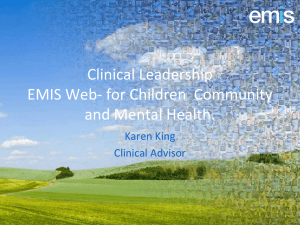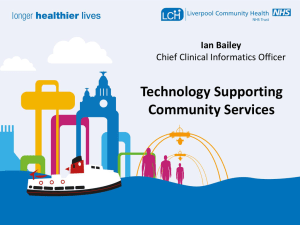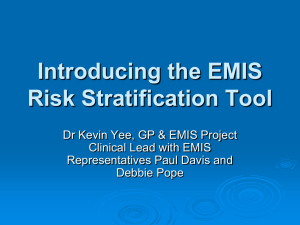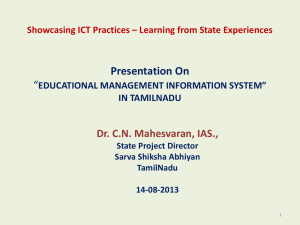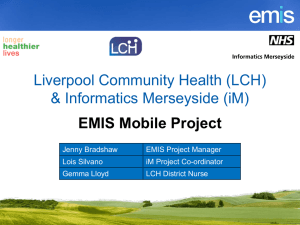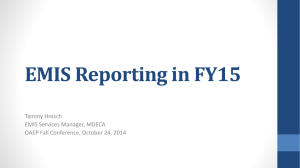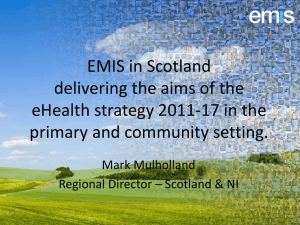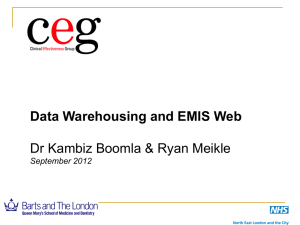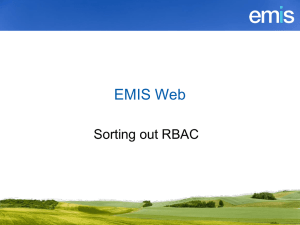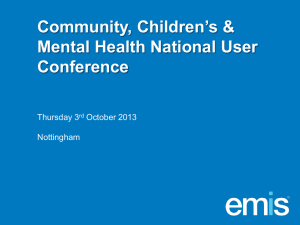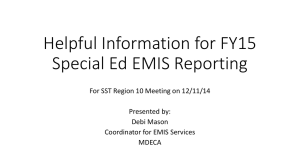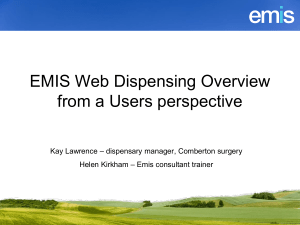8b.2 IDOT EMIS Imple.. - Trb
advertisement
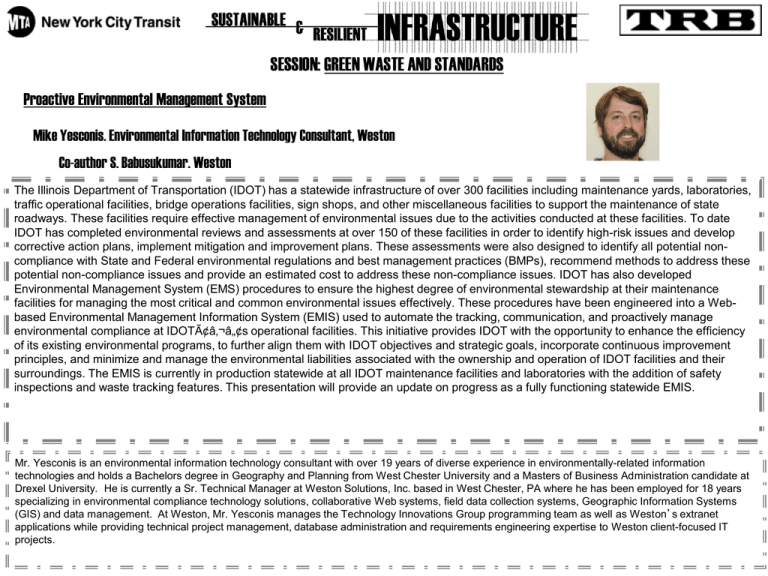
SESSION: GREEN WASTE AND STANDARDS Proactive Environmental Management System Mike Yesconis. Environmental Information Technology Consultant, Weston Co-author S. Babusukumar. Weston The Illinois Department of Transportation (IDOT) has a statewide infrastructure of over 300 facilities including maintenance yards, laboratories, traffic operational facilities, bridge operations facilities, sign shops, and other miscellaneous facilities to support the maintenance of state roadways. These facilities require effective management of environmental issues due to the activities conducted at these facilities. To date IDOT has completed environmental reviews and assessments at over 150 of these facilities in order to identify high-risk issues and develop corrective action plans, implement mitigation and improvement plans. These assessments were also designed to identify all potential noncompliance with State and Federal environmental regulations and best management practices (BMPs), recommend methods to address these potential non-compliance issues and provide an estimated cost to address these non-compliance issues. IDOT has also developed Environmental Management System (EMS) procedures to ensure the highest degree of environmental stewardship at their maintenance facilities for managing the most critical and common environmental issues effectively. These procedures have been engineered into a Webbased Environmental Management Information System (EMIS) used to automate the tracking, communication, and proactively manage environmental compliance at IDOT’s operational facilities. This initiative provides IDOT with the opportunity to enhance the efficiency of its existing environmental programs, to further align them with IDOT objectives and strategic goals, incorporate continuous improvement principles, and minimize and manage the environmental liabilities associated with the ownership and operation of IDOT facilities and their surroundings. The EMIS is currently in production statewide at all IDOT maintenance facilities and laboratories with the addition of safety inspections and waste tracking features. This presentation will provide an update on progress as a fully functioning statewide EMIS. Mr. Yesconis is an environmental information technology consultant with over 19 years of diverse experience in environmentally-related information technologies and holds a Bachelors degree in Geography and Planning from West Chester University and a Masters of Business Administration candidate at Drexel University. He is currently a Sr. Technical Manager at Weston Solutions, Inc. based in West Chester, PA where he has been employed for 18 years specializing in environmental compliance technology solutions, collaborative Web systems, field data collection systems, Geographic Information Systems (GIS) and data management. At Weston, Mr. Yesconis manages the Technology Innovations Group programming team as well as Weston’s extranet applications while providing technical project management, database administration and requirements engineering expertise to Weston client-focused IT projects. Proactive Environmental Management System Illinois Department of Transportation (IDOT) EMIS Progress Update TRB ADC Conference June 18, 2014 Steve Gobelman, P.E., P.G. S. Babusukumar, P.G. Michael Yesconis ® 2 Background The Illinois Department of Transportation (IDOT) maintains over 300 facilities statewide to support the state’s highway maintenance activities. - Vehicle Maintenance Activities Handling Hazardous Materials Underground Storage Tanks Aging Facilities Decentralized Environmental Management (facility by facility) IDOT proactively conducted Environmental Compliance Audits (ECAs) at 150 facilities and identified high priority environmental compliance issues. The next step was to implement a solution to address the environmental issues found during the ECAs. 3 Implementation Approach Environmental Compliance Audits performed at facilities to establish high priority issues and a baseline. Procedures and Technical Guidance documents were developed to manage high priority concerns as a part of an initial Environmental Management System (EMS). To facilitate the implementation of the EMS a Web-based Environmental Management Information System (EMIS) has been developed to provide a consistent and centralized approach to EMS Asset Inventories to define inspection targets were conducted during the ECA’s. 4 Implementation Approach Engage the End Users of the EMIS through meetings and informational overview documents (FAQs). Training for each district is conducted on-site at their respective district headquarters. Users are also provided an EMIS Quick Start Guide for reference after training. As of 2013, the EMIS has been implemented statewide at all 9 IDOT Districts containing over 300 maintenance facilities and laboratories. The rollout was completed over a 3 year period. Follow-up trainings are now being conducted in certain districts. 5 Examples of Environmental Compliance Issues Summary of Issues: Uncovered salt storage resulting in stressed vegetation and impacts to local waterways. Tanks that were leaky tanks and lacking proper labeling and secondary containment. Improperly maintained Oil Water Separators and inlet filter units. Resulting EMS Procedures: Salt Storage Bulk Oil Products Solvent-based Parts Washers Hazardous Waste Streams Universal Waste Used Oil Filters & Fuel Filters Underground Storage Tanks Improperly stored waste and hazardous materials. Oil/Water Separators / Inlet Filter Units Stormwater Drainage Pathways 6 Examples of Environmental Compliance Issues Impact to Stormwater (Salt Containing Prussian Blue) Impact to Storm Water 7 Examples of Environmental Compliance Issues Stressed Vegetation From Salt Runoff Stressed Vegetation From Salt Runoff 8 Examples of Environmental Compliance Issues Leaky Tanks Leaky Waste Oil Tank 9 Examples of Environmental Compliance Issues Sludge in Oil Water Separator Oil Water Separator Requiring Maintenance 10 Examples of Environmental Compliance Issues Lack of Secondary Containment and Tank Labels Improper Labeling 11 Examples of Environmental Compliance Issues Potential Waste Stored in Open Containers Improperly Discarded Empty Drums 12 Examples of Environmental Compliance Issues Parts Washer with Solvents Left Open When Not in Use Unsecured Gas Cylinders 13 Examples of Environmental Compliance Issues Dilapidated Buildings/ Unsafe Conditions Unsafe Structures 14 Examples of Environmental Compliance Issues Improperly Stored Used Batteries Improper Storage of Flammable Material 15 Examples of Environmental Compliance Issues Improper Disposal of Oil Filters in Trash Clogged Drains/Impact to Storm Water 16 EMS to EMIS Paper-Based EMS Procedure Documents 17 System Features Main Menu/User Tasks Inspections Issue Identification and Resolution Technical Guidance & Facility Maps Asset Inventories Waste and Bulk Product Manager Reporting & Analysis (Including SPCC and Tier 2 Compliance Reporting) 18 EMIS Workflow 19 EMIS Workflow 20 EMIS Main Screen 21 EMIS Inspection w/ Asset Data Pop-up 22 EMIS Completed Inspection 23 Issue Resolution Once issues are logged they can be resolved in 3 different ways: •Field Resolved – The inspection finds an issue that that was resolvable during the inspection (i.e., cover a pile of salt). •Self-Assigned – The inspection finds an issue that he/she can resolve, but cannot attend to it during the inspection. •Notify Field Engineer – The inspection finds an issue that needs Field Engineer support or escalation. 24 Issues Awaiting Assignment Issues in the Issues Task window on the EMIS home page. These are currently unassigned and awaiting assignment from the inspections Field Engineer. 25 Asset Inventory 26 Asset Inventory 27 Technical Guidance & Facility Maps 28 EMIS Reporting Report Types: •Inspections •Issues •Issues Status •Waste Inventory •Waste Shipping •Bulk/Waste Type •Bulk Inventory •SPCC Compliance •Tier 2 Compliance •Capital Findings/ Issues 29 Waste Management Features •Waste Inspection Checklist - Identify issues in the storage and handling of Waste at each facility” (labeling, storage, secondary containment) •Waste Inventory Form - Provides inputs to track accumulated Waste stored at each facility •Waste Shipping Tracking -Tracking of where the waste is being transported to and by whom. The Pickup Date, Transport From, Transport To as well as Transporter can be tracked for any given shipment by facility. •Request Waste Pickup Notifications – Allows system users to request a waste pickup if capacity to store those waste streams are low. Notification goes to IDOT Waste Specialist. Allows for more efficient pickup/disposal logistics. 30 EMIS Waste Inventory 31 EMIS Waste Shipping The last step in the Waste process is the Waste Shipping feature that allows for the tracking of where the waste is being transported to and by whom. The Pickup Date, Transport From, Transport To as well as Transporter can be tracked for any given shipment by facility. 32 Bulk Product Tracking/SPCC The EMIS provides a Bulk Product Inventory form with the ability to determine if an SPCC plan is required at a given facility based on the amount of bulk product being stored on-site along with associated reports to assist in the tracking of bulk product at each facilities. Reports provide several ways to query and report on Bulk product inventories and SPCC status. Examples provided on the following slide. The SPCC Reporting feature provides a means to list all facilities that require a SPCC plan 33 Bulk Product Tracking/SPCC 34 EMIS Admin Features/Archives Admin Features: •Facilities •Users •Inspections •Tasks •User Log •System Valid Values •Inspection Archive •Issues Archive 35 EMIS Top Findings Are stormwater inlet protection devices provided when no secondary containment is provided? Locate liquid salt storage tanks away from storm drains, trenches or ditches that lead off site. If this is not possible, provide appropriate inlet protection devices such as storm drain covers to be used when transferring liquid salt or in the event of a leak. Are outdoor stockpiles of potential pollutants (e.g., batteries, oil products, salt, scrap metal, etc) covered? Is this AST equipped with secondary containment? Are all hazardous waste containers stored on secondary containment? 36 EMIS Features Review User-friendly and intuitive interface Build specifically for IDOT’s workflow requirements Web-based Portal provides a custom user experience based upon their role in the system Electronic notification of Task Assignments Electronic Inspection Checklists for all EMS Procedures Corrective Action / Issue Resolution and Issue Prioritization features Asset Management Robust Reporting and Task Tracking tools 37 EMIS Progress Update Statewide Roll-out completed in 2013 Safety Managers and Inspections implemented Statewide Waste Pickup Contract Automation Inter-District Waste Pickup Notifications Tier 2 Reporting being implemented OSFM UST Inspections for Type A/B Operators Overall upgrades/workflow/reminders Administrative tools updates Enhanced Compliance Documents library for storing permits, SPCC plans, facility maps and environmental compliance assessments (ECAs) 38 Benefits of the EMS & EMIS Effective compliance with regulatory requirements with centralized storage of all compliance records Protecting public health and the environment Improve IDOT’s public image as a green organization Facilitate efficient fiscal planning and prioritization of environmental issues Manage challenging environmental issues with top-to-bottom engagement of all IDOT stakeholders from a central Web-based system Provides environmental awareness training for all users through using the system and performing inspections. 39 Contact Information Steven Gobelman, P.E., L.P.G. IDOT Bureau of Design & Environment steven.gobelman@illinois.gov (217) 785-4246 S. Babusukumar, P.G. Weston Solutions, Inc babu.babusukumar@westonsolutions.com (847) 918-4018 Michael Yesconis Weston Solutions, Inc mike.yesconis@westonsolutions.com (610) 701-3931 40
